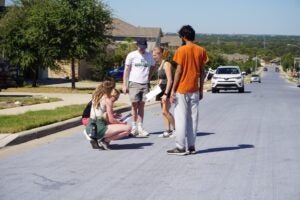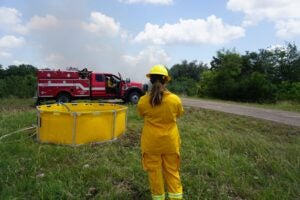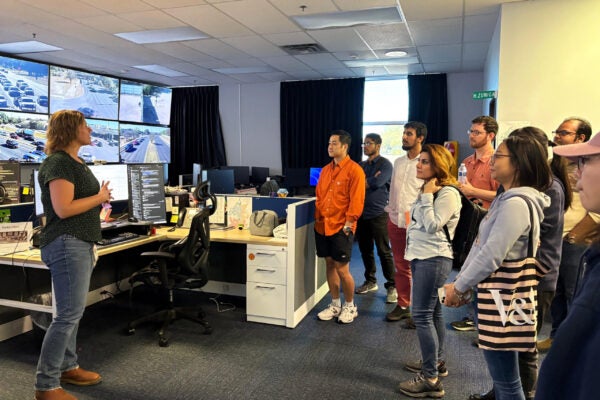The City of Austin has renewed and expanded a partnership with The University of Texas at Austin, strengthening a now proven model that connects University research with community needs. During the next five years, the city is authorized by City Council to invest up to $12 million to continue the collaboration — originally launched in 2020 — and extend it to five additional Central Texas institutions: Austin Community College, Concordia University Texas, St. Edward’s University, Huston-Tillotson University and Texas State University.
Since its inception, the UT-City partnership has launched nearly 60 projects that are turning research into practical results for Austinites — advancing work in climate resilience, transportation safety, public health, housing and more. Together, UT and the City have streamlined project administration through a master Interlocal Agreement (ILA), reducing contracting time and making it easier for researchers and city staff to collaborate.
“The successes and insights gained over the last five years have delivered measurable outcomes and opened the doors for an expanded ecosystem,” said Charles Purma, Program Manager for the City of Austin. “Our partnership is driving significant benefits across research advancement, operational efficiency, policy innovation and community impact.”
City leaders say the expanded alliance marks an important next step in regional collaboration — uniting a wide range of academic expertise to address complex civic challenges through data-driven, interdisciplinary approaches. Already, other cities and agencies have expressed interest in replicating Austin’s model, which has emerged as a compelling example of how research partnerships can accelerate municipal innovation and improve community outcomes.
According to the City of Austin, standout projects include:
Upgraded Emergency Preparedness and Guidance
UT researchers Lucy Atkinson and Junfeng Jiao are leading a three-phase interdisciplinary project exploring how artificial intelligence can deliver real-time emergency guidance across multiple languages, particularly for residents whose primary language is not English or Spanish. Across three studies, the team is testing which message strategies are most effective at engaging audiences and promoting disaster preparedness and response.
Atkinson, an associate professor in the Stan Richards School of Advertising & Public Relations, contributes expertise in communication and AI strategy, while Jiao, an associate professor in the School of Architecture and director of UT’s Ethical AI research traineeship program, is developing the chatbot technology as part of the Good Systems Grand Challenge. Following data collection completed in February 2025, the team expects to finalize the AI chatbot by year’s end, pending city approval for integration into Austin’s emergency preparedness system.
Traffic Tech for Safer Intersections
Led by Natalia Ruiz Juri of the Center for Transportation Research, UT researchers partnered with the City of Austin to evaluate how advanced computing and video analytics can improve intersection safety. Using traffic camera footage, the team compared the accuracy of several emerging technologies for detecting vehicles, pedestrians and bicycles, and assessed their ability to identify safety risks such as near misses and red-light violations.

The project supported Austin’s Vision Zero goals — eliminating traffic-related fatalities — by revealing patterns in pedestrian movement and developing a framework to guide future technology-based traffic safety assessments, helping make Austin’s streets safer for everyone.
Forecasting and Preparing for Extreme Austin Weather
Created in 2023, the UT-City CoLab connects the City of Austin’s need for timely, actionable climate data with research expertise across geosciences, engineering, public affairs and planning. Led by Dev Niyogi, Patrick Bixler, Tim Keitt and Sergio Castellanos, the CoLab brings together city experts on climate adaptation and resilience; UT researchers from the Jackson School of Geosciences, LBJ School of Public Affairs, School of Architecture, College of Natural Sciences and the Cockrell School of Engineering; and local communities to integrate cutting-edge science with practical and evidence-based strategies for resilience.


Since its inception, the CoLab has updated Austin’s long-term climate projections, launched seasonal outlooks for summer and winter, and provided critical data to help city departments plan for and respond to extreme weather. Now in its third year, with sustained City funding and new research investments, the CoLab is advancing projects on forest health and wildfire risk, integrating climate data into building codes, developing and testing scenario planning tools for infrastructure and community health, and studying how “cooling corridors” can reduce heat impacts.
Together, these efforts advance the City’s resilience goals and help translate University research into real-world climate solutions for Austin’s future.
Data-Driven Solutions To Improve Homeless Services
Sherri Greenberg, a professor of practice at the LBJ School of Public Affairs, worked with the City of Austin’s Downtown Austin Community Court (DACC) to assess the design, implementation and outcomes of its homeless services program, Intensive Case Management, which has reduced repeat interactions with the justice system among the population it serves.
The DACC uses a person-centered, housing-focused case management model to help people experiencing homelessness achieve long-term stability. Greenberg and DACC also co-developed a sustainable, scalable community platform to improve access to legal, mental health and substance use services while equipping service providers with better data to support lasting change.
Currently in early planning stages, the second phase of this project will evaluate and enhance DACC’s federally funded Mobile Court initiative, which runs through 2028.
Ecological Stewardship at Balcones Canyonlands Preserve
Since 2021, College of Natural Sciences research scientist Ed LeBrun has helped support the City of Austin’s obligations under the Balcones Canyonlands Conservation Plan by addressing the threat of invasive tawny crazy ants to endangered species and sensitive habitats within the Balcones Canyonlands Preserve, a 33,000-acre system of preserves. Funded jointly by the City of Austin and Travis County, the project evaluates the ants’ impacts on endangered karst invertebrates and golden-cheeked warblers, tests biological control methods, and develops management strategies to protect native ecosystems. In addition to advancing understanding of tawny crazy ant ecology, the work provides critical data and training for City staff, helping inform long-term conservation and land management efforts.
The project also aligns with the City’s Strategic Direction 2023 goals (adopted in 2018) to sustain Austin’s parks, open spaces and urban trail networks through evidence-based environmental stewardship.
Understanding the Neighborhood Impacts of Austin’s Land Use Policy Changes
Led by associate professor Herschel Thomas from the LBJ School of Public Affairs, researchers worked with the City of Austin to study how recent land use policy changes — including the HOME 1 and HOME 2 initiatives — are reshaping the city’s neighborhoods. The project is evaluating how these policies affect housing production, affordability, demographic composition and neighborhood mobility, with a focus on understanding who benefits and who may be displaced as Austin grows. By comparing Austin’s experience with that of similar cities, the research aims to help city officials assess the effectiveness of land use reforms and develop a framework for ongoing evaluation. This work builds on the city’s Strategic Housing Blueprint and decades of rapid urban change, providing critical insight into how zoning and development policies can better support affordable housing for all residents.

Looking Ahead: The Next Chapter in a Proven Partnership
To celebrate the partnership’s achievements and chart the course for the future, a University Partnership Showcase is planned for December on UT’s main campus. The event will bring together representatives from all partner universities and highlight standout projects.
This will be the first time all partners gather publicly, marking a new chapter in regional collaboration. As the ecosystem grows, so does the potential for transformative impact across the region.
“Addressing Austin’s most complex civic challenges requires connecting research and innovation directly to the people we serve,” said Daniel Culotta, assistant director at Austin Budget and Organizational Excellence. “By grounding this expanded partnership in an approach intentionally focused on municipal purpose and residents, we’re not just generating new ideas — we’re translating them into sustainable products, services and policies that cities can adopt to deliver better outcomes for all.”
Visit the City of Austin dashboard to learn more about the UT-City of Austin partnership and see the complete list of projects supported.




